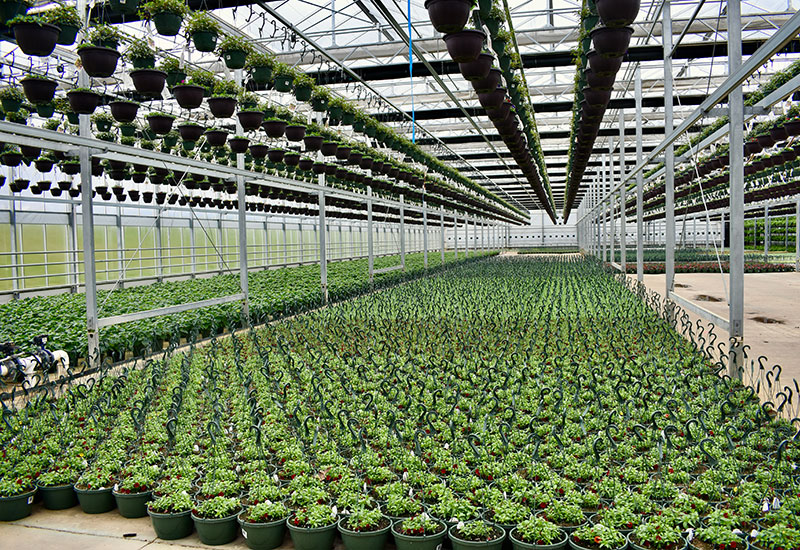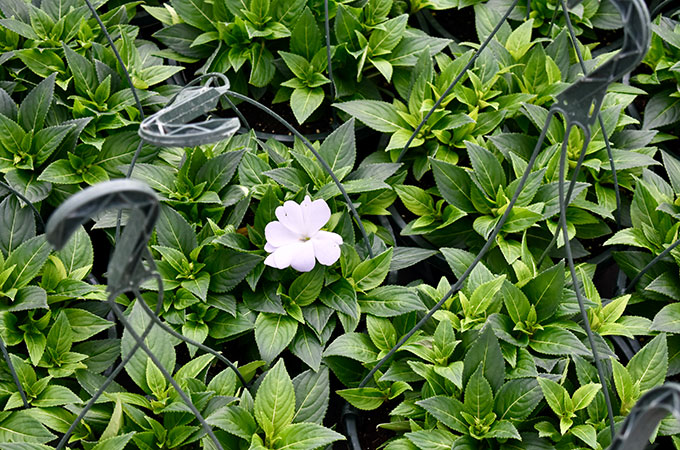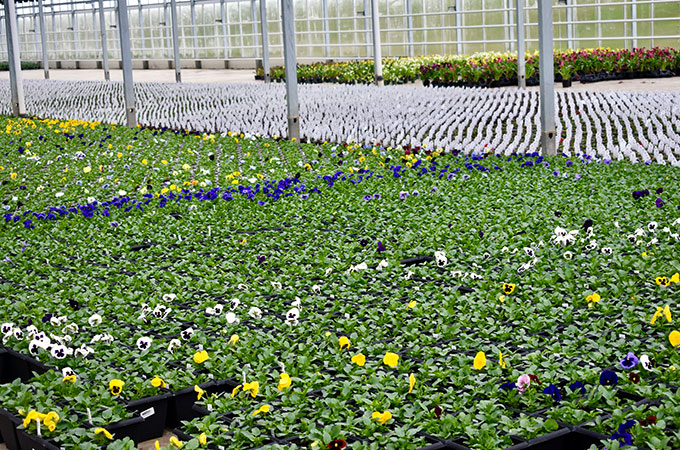We Know our Sources: Eagle Creek Growers

This post was written by Heinen’s partner, Halle Snavely.
Jill Cain comes from a family with a long history in horticulture. Three generations to be exact. She grew up working in her family’s greenhouses, so it’s not too surprising that she pursued a career as a greenhouse grower. “I worked in greenhouses on my spring break and summer break and I decided that that’s what I wanted to do,” she explains.
She attended Ohio University, studying entrepreneurship and biology, and started Eagle Creek Growers in 1999 after completing her senior thesis on launching a greenhouse operation. Not long after the launch, she hired Todd Cain, her eventual husband, and the business continued to expand from there. Today, Eagle Creek Growers is a 6-acre floral greenhouse in Mantua, OH growing a wide variety of annuals, including lilies, hydrangeas, herbs, poinsettias, combination baskets and plenty more.

Commitment to Quality
Quality is the number one driver at Eagle Creek Growers, and they are always striving to improve. Todd manages the facility and their greenhouse production including space planning, crop and container procurement, scheduling and planting. Jill is involved in every aspect of their growing operation and works closely with their lead grower to make decisions around crop culture, growing and crop selection.
A lot goes into growing a good quality plant, particularly one that has to do well once a customer brings it home. Jill notes that quality can vary depending on the plant. “Some plants you want a lot of blooms, some you want a nice compact shape. We pick plants based on a lot of different factors. We have to be able to grow them in a commercial greenhouse like this, but we also have to keep the consumer in mind, because we want this plant to do well for them. Just because a plant does well in a greenhouse environment doesn’t mean it’s going to do well for the consumer. We have to weigh both of those factors when we’re deciding what plants to grow from season-to-season and year-to-year.”

A Green Operation
Sustainability is weaved into just about every aspect of their operation. After years of dealing with unpredictable gas prices, they knew they had to make a change. They implemented a number of initiatives to eliminate fossil fuels, including the purchase of a biomass boiler. Today more than 90% of their heat comes from burning biomass like sawdust and wood chips that they source from a nearby Amish pallet company.
The biomass heats up hot water, which is then run through pipes in the concrete floor and around the perimeter of the greenhouse. The heated floor allows the warmth to hit right at the roots of the plants, where they need it most, and provides a more consistent type of heat compared to forced air. Todd further explains that “every acre of the greenhouse has heat retention curtains, so as the light outside diminishes and we’re not getting that nice greenhouse effect, the curtains will close over the entire top section of the greenhouse, allowing it to retain up to 40% of the heat. By saving heat, we’re burning less.”

All of the concrete floors are fitted with drains that feed into two large water tanks, which means that all of the water used in their operation is recycled. They also have wells along the property that are constantly feeding water into these water tanks, which they then use to irrigate all of the plants. Additionally, they use a software program that constantly monitors the conditions throughout the greenhouse. This keeps everything running efficiently and allows them to make real-time adjustments to temperature, humidity and other metrics to give the plants precisely what they need, when they need it.
A Growing Partnership (no pun intended)
Eagle Creek Growers has been working with Heinen’s for 15 years. You can find their products at Heinen’s stores year-round, including oriental lilies, hydrangeas, basil, tomato plants, combination baskets and planters, dahlia bowls, mums and poinsettias.
According to Jill, it’s a partnership that makes a lot of sense. “They’re not the biggest grocery chain in the area and they’re not the smallest. I feel the same way about us as a grower. Our businesses are a good fit in that respect. We pay attention to the details of our respective businesses and can pivot quickly if market changes happen.”
Most importantly, they value a lot of the same principles as Heinen’s, such as their commitment to producing quality products and supporting the local community. Eagle Creek Growers has 24 full-time employees that are all local, and many of them have worked there for years. “We’ve built a strong working relationship with Heinen’s and have really enjoyed our partnership over the years.”


